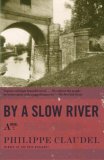Summary | Excerpt | Reviews | Beyond the Book | Readalikes | Genres & Themes | Author Bio

I
It's very difficult to find the beginning. So much time has gone by that words
will never bring back—and the faces too, the smiles, the wounds. Even so, I must
try. I have to cut open the belly of the mystery and stick my hands deep inside,
even if none of that will change a thing.
If somebody were to ask me how on earth I know all the things I'm going to
recount, I'd answer that I just do. I know them because for twenty years they've
been as familiar to me as the fall of night and the dawn of day. Because in fact
I've spent my life trying to piece them together, to put them into place. So
they can speak and I can listen. That used to be my job, more or less.
I'll be calling forth a lot of shadows, but one will be out front. It belongs to
a certain Pierre-Ange Destinat. He was the prosecutor in V for more than thirty
years, and he plied his trade like clockwork, never faltering, never breaking
down. Actually, you could say he was an artist, and he didn't even need a museum
to show his art. In 1917, at the time of the Case—as people here called it,
always with a sigh, it seemed—he was over sixty and had retired only the
previous year. Though he hardly spoke, he always made a great impression. He was
a tall impassive man who resembled an indifferent bird, far-off and majestic,
with pale eyes that never seemed to move and lips whose thinness he didn't
bother to disguise with a moustache. His forehead was high and his hair a most
distinguished gray.
V is about twenty kilometers from our town. Twenty kilometers in 1917 was very
far indeed, especially in winter--especially in a war that showed no interest in
ending. The war caused great commotion on the roads as they became jammed with
handcarts and trucks, flooded with stinking fumes and thousands of thunderclaps.
Even though the front was fairly nearby, from our town it seemed an invisible
monster, another country.
Destinat was known by different names, depending on whom one asked and where.
Among the inmates in the jail at V, he was generally called Bloodsucker. In one
cell I even saw a drawing of him, carved with a knife on the thick oak door—not
a bad likeness, in fact. Admittedly, the artist had had plenty of time to admire
the model during the fifteen long days of his trial.
When we ran into Pierre-Ange Destinat on the street, the rest of us called him
Mr. Prosecutor. Men raised their caps to him, and women of the humbler sort
curtsied. Fine ladies of his own social class would incline their heads ever so
slightly, like little birds when they drink from gutters. Whatever the greeter
or greeting, it seemed no matter. He didn't answer—or did it so faintly you
would've needed four well-polished opera glasses to see his lips move. But it
wasn't disdain, as most believed; I think it was simply detachment.
All the same, there was one young lady who had almost understood him, a girl I
will speak of again and who called him Sadness, a nickname she kept to herself.
Maybe it's her fault that everything happened—but then, she never knew anything
about it.
At the beginning of the century, a prosecutor was still a figure of great
importance. And in time of war, when a single hail of bullets could mow down a
whole company of solid lads, seeking the death of one lone man in chains
required craftsmanship. I don't think he acted out of cruelty when he went after
the head of some poor slob who had battered the postman or disemboweled his
mother-in-law. The jerk stood in front of him between two officers, with
handcuffs on his wrists, but at best Destinat hardly noticed him. He looked
right through, as if the man had already ceased to exist. Destinat never
prosecuted a flesh-and-blood criminal; he defended an idea, simply an idea: his
own idea of good and evil.
Excerpted from By a Slow River by Philippe Claudel Copyright © 2006 by Philippe Claudel. Excerpted by permission of Knopf, a division of Random House, Inc. All rights reserved. No part of this excerpt may be reproduced or reprinted without permission in writing from the publisher.
The third-rate mind is only happy when it is thinking with the majority. The second-rate mind is only happy when it...
Click Here to find out who said this, as well as discovering other famous literary quotes!
Your guide toexceptional books
BookBrowse seeks out and recommends the best in contemporary fiction and nonfiction—books that not only engage and entertain but also deepen our understanding of ourselves and the world around us.